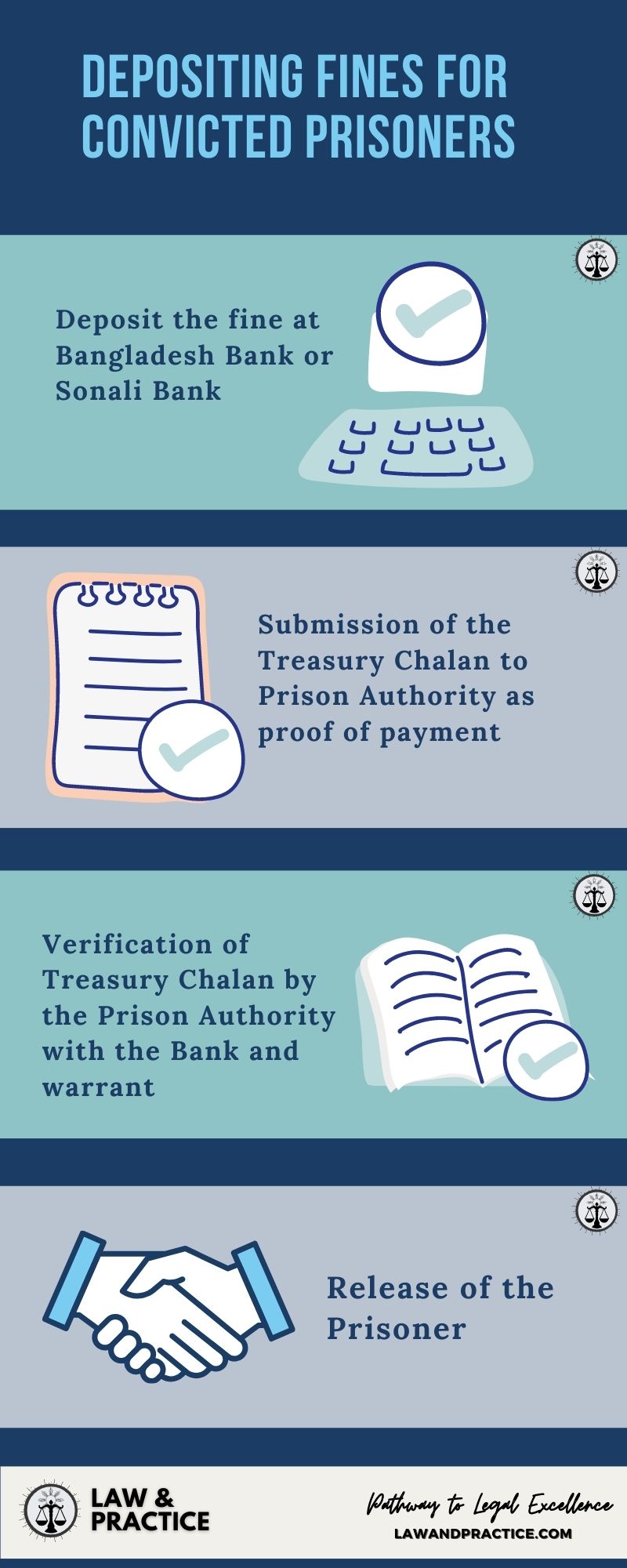
Punishment works as an integral part of the criminal justice system as no law of criminal nature would have any value unless there is a consequence of a breach. Hence, a provision that defines an offense also provides a punishment that is justified socially and legitimized through a legal framework.
The Penal Code, 1860 in section 53 provides punishments to which offenders are liable under the provisions of this Code are of five kinds:
(1) Death;
(2) Imprisonment for life;
(3) Imprisonment;
(4) Forfeiture;
(5) Fine.
The provisions of the Penal Code, 1860 as well as other legislations within the criminal justice system often provide both imprisonment and fines as punishment for an offense. Hence the courts follow and often sentence both imprisonments and fines but for fines, the courts generally also state further punishment of imprisonment for failing to pay the fines.
The convicts in the prisons commonly intend to pay the fine soon before the end of their imprisonment or immediately at the end of their term of imprisonment. However, the Prisons Act, 1894 does not offer any provision for the convicted prisoners to pay fines directly to the Prison Authority while serving their imprisonment in the prison. The convicted prisoners, therefore, require assistance of their relatives or someone to engage lawyers on their behalf in order to obtain court’s permission to deposit the fines which creates further complicacy for the convicted prisoners in finding assistance of someone to represent them to engage a lawyer, finding the file of the case which often become difficult to be traced/found in the lower courts as the files usually sent to higher courts due to appeals and also often due to old records as judgments were delivered decades ago. The process becomes more cumbersome if a convicted prisoner has been transferred to a prison far from his/her home district. For such complicacy in the procedure, many convicted prisoners fail to deposit their fines and have to serve extended imprisonment for the unpaid fines.
Addressing the complicacy in the procedure and in order to simplify the procedure for the convicted prisoners to deposit the fines, the Supreme Court of Bangladesh has issued a direction exercising its powers conferred to it by Chapter IIIB of the Supreme Court of Bangladesh (High Court Division) Rules, 1973.

Circular No. 5/2016 dated 20.09.2016 states that if a court pronounces a sentence with both an imprisonment and a fine, then any close relative or a representative of a convicted prisoner at any time before or after the end of the term of imprisonment of the convicted prisoner may deposit the fine at a branch of Bangladesh Bank or Sonali Bank situated within either the district of which the court has pronounced the sentence or the district in which prison the convicted prisoner is serving his/her term of imprisonment. Neither the convicted prisoner nor his/her representative has to take prior permission from the court in this regard.
The treasury chalan codes for deposing fines are as follow:
Name of the Court imposed the fine
|
Code Number
|
Sessions or equivalent Courts
|
1-2141-0000-1901
|
Chief Metropolitan Magistracy
|
1-2107-0000-1901
|
Chief Judicial Magistracy
|
1-2108-0000-1901
|
Once the fine has been duly deposited, the Treasury Chalan has to be submitted to the prison in which the convicted prisoner is serving his term of imprisonment. Upon receipt of the Treasury Chalan, the Prison Authority shall verify the Treasury Chalan with the bank through online or telephone and also shall verify the amount with the warrant. Once the Prison Authority is satisfied that the full amount of the fine has been deposited, it shall release the convicted prisoner and inform the court about the release.
Download: Circular No. 5/2016 dated 20.09.2016





